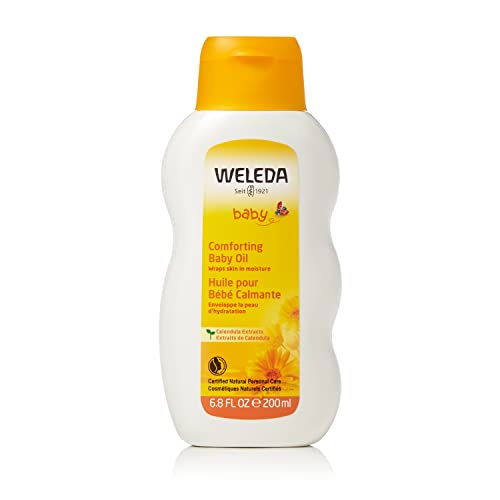
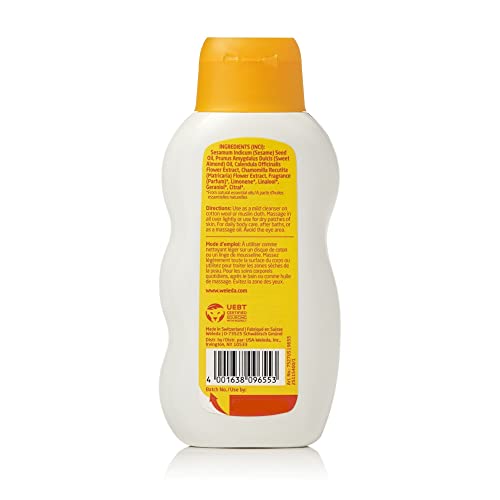
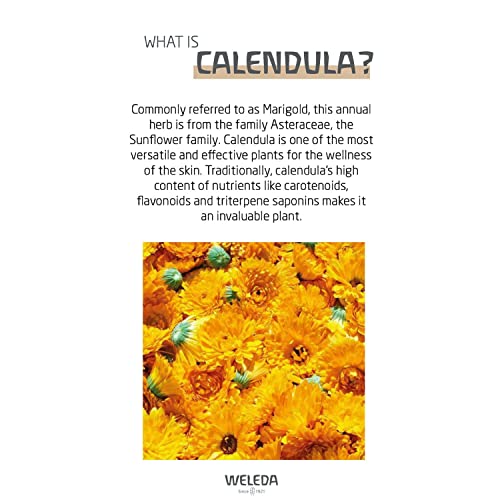



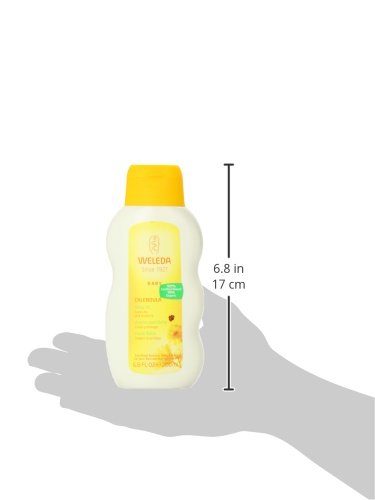
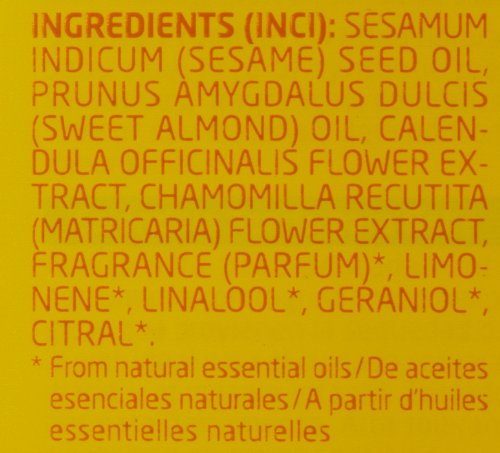
Weleda Baby Body Oil - Comforting Moisture with Calendula & Sweet Almond - 6.8 Fl Oz


Geraniol
High RiskGeraniol is a naturally occurring scent ingredient commonly found in essential oils from plants such as geraniums and lemongrass. It is primarily used for its pleasant floral aroma in perfumes, cosmetics, and household products.
Sustai Insights
Geraniol serves as a fragrance component and offers a natural option for scenting products. However, it has a high allergenic potential and may cause skin irritation in sensitive individuals. While it is considered low risk for carcinogenicity and reproductive toxicity, regulatory bodies have placed restrictions on its use due to allergenic concerns. Overall, the assessment reflects a high-risk level, particularly for those prone to allergies, highlighting the need for caution in its application.
Fragrance
High RiskFragrance refers to a mixture of aromatic compounds used in products to provide scent. It is commonly listed as 'fragrance' or 'parfum' on product labels and can serve various functions, including enhancing user experience and masking undesirable odors.
Sustai Insights
Fragrance offers functional benefits by improving product appeal; however, it poses significant health risks, notably a high likelihood of causing allergies and allergic contact dermatitis. Environmental risks include potential pollution and endocrine disruption, though its overall carcinogenicity is low. Regulatory bodies have noted concerns regarding its use, leading to a high-risk classification. Safe usage practices should be observed, and alternatives such as natural essential oils are recommended for those sensitive to synthetic fragrances.
Linalool
High RiskLinalool is a terpene commonly found in various plants, particularly in lavender and mint. It is primarily used in products for its fragrance and potential antimicrobial properties. Linalool is also utilized in formulations for its ability to enhance the sensory experience of personal care and household products.
Sustai Insights
Linalool offers functional benefits as a naturally occurring fragrance component and may exhibit antimicrobial properties. However, it presents high allergenic potential, with concerns about skin irritation and sensitization. Environmental risks include contamination issues, though it is not classified as a persistent pollutant. Regulatory bodies have noted the need for careful handling due to its allergenic nature. Overall, despite some beneficial attributes, the ingredient carries a high risk profile, warranting cautious use and consideration of safer alternatives.
Geranial
Medium RiskGeranial is a naturally occurring compound found in essential oils, primarily derived from lemongrass. It is commonly used in fragrances and flavoring due to its lemon-like scent. Geranial acts as a fragrance component and is often included in personal care and cosmetic products.
Sustai Insights
Geranial offers functional benefits as a fragrance enhancer in various products. While it is generally well-tolerated, it has a moderate allergenic potential, and caution is advised for sensitive individuals. Environmentally, it does not appear to be bioaccumulative, but its use is restricted in some verified products. Overall, the risk level is assessed as medium, suggesting that while it is useful, careful consideration of exposure is warranted.
Limonene
Medium RiskLimonene is a scent ingredient and solvent naturally found in citrus fruits, commonly used in personal care and cleaning products for its fragrant properties. It serves as a flavoring agent and enhances the overall sensory experience of products.
Sustai Insights
Limonene offers functional benefits such as acting as a solvent and fragrance enhancer. However, it carries a high allergenic potential, which can trigger skin or respiratory sensitivities in some individuals. Environmental concerns include moderate persistence and bioaccumulation, along with potential ecotoxicity. Regulatory restrictions necessitate verification in products containing this ingredient. Overall, the risk level is assessed as medium, emphasizing the importance of cautious use, particularly for sensitive populations. Safer alternatives may be considered to mitigate these risks.
Corylus (Hazelnut) Oil
Low RiskCorylus (hazelnut) oil is derived from the nuts of the hazel tree. It is primarily used in cosmetic and skincare products for its emollient properties, providing moisture and enhancing skin texture. The oil is rich in fatty acids and vitamins, contributing to its function as a skin conditioning agent.
Sustai Insights
Corylus (hazelnut) oil offers functional benefits as a moisturizer and skin conditioner while being biodegradable and potentially sustainably sourced. Health risks are low, with minimal concerns related to carcinogenicity, allergenic potential, or reproductive toxicity. Environmental impacts are also low, with no known bioaccumulation issues. Regulatory status shows no restrictions. Overall, the ingredient is assessed as low risk, with safe usage practices recommended and no significant alternatives noted.
Sesamum Indicum (Sesame) Oil
Low RiskSesamum indicum (sesame) oil is derived from the seeds of the sesame plant. It is commonly used in cosmetic formulations due to its emollient properties and ability to nourish the skin. This oil is rich in fatty acids and antioxidants, contributing to its effectiveness in various skincare products.
Sustai Insights
Sesame oil offers several functional benefits, including moisturization and nourishment for the skin, along with potential antioxidant properties. It is generally regarded as safe, with low concerns regarding carcinogenicity, allergies, and reproductive toxicity. Environmental risks are minimal, and the oil is not known to be bioaccumulative. Regulatory bodies do not impose significant restrictions on its use. Overall, sesame oil poses a low risk, making it a viable ingredient in cosmetic formulations, although consumers should consider potential allergies and choose responsibly sourced products.
Anthemis Nobilis (Chamomile) Flower Extract
Low RiskAnthemis nobilis (chamomile) flower extract is derived from the flowers of the chamomile plant. It is commonly used in cosmetic and personal care products for its soothing properties and potential anti-inflammatory effects. Its role primarily centers around skin calming and providing a pleasant fragrance.
Sustai Insights
Chamomile extract offers functional benefits, particularly in soothing irritated skin and reducing inflammation. It is considered sustainably sourced and biodegradable. Health risks are minimal, with low concerns for carcinogenicity, allergies, and neurotoxicity. Environmental risks are also low, with no significant pollutant or bioaccumulation potential. Regulatory status indicates no major restrictions, affirming its safe use in cosmetics. Overall, this ingredient presents a low risk, making it a favorable choice in personal care formulations.
Geraniol
High RiskGeraniol is a naturally occurring scent ingredient commonly found in essential oils from plants such as geraniums and lemongrass. It is primarily used for its pleasant floral aroma in perfumes, cosmetics, and household products.
Sustai Insights
Geraniol serves as a fragrance component and offers a natural option for scenting products. However, it has a high allergenic potential and may cause skin irritation in sensitive individuals. While it is considered low risk for carcinogenicity and reproductive toxicity, regulatory bodies have placed restrictions on its use due to allergenic concerns. Overall, the assessment reflects a high-risk level, particularly for those prone to allergies, highlighting the need for caution in its application.
Geranial
Medium RiskGeranial is a naturally occurring compound found in essential oils, primarily derived from lemongrass. It is commonly used in fragrances and flavoring due to its lemon-like scent. Geranial acts as a fragrance component and is often included in personal care and cosmetic products.
Sustai Insights
Geranial offers functional benefits as a fragrance enhancer in various products. While it is generally well-tolerated, it has a moderate allergenic potential, and caution is advised for sensitive individuals. Environmentally, it does not appear to be bioaccumulative, but its use is restricted in some verified products. Overall, the risk level is assessed as medium, suggesting that while it is useful, careful consideration of exposure is warranted.
Limonene
Medium RiskLimonene is a scent ingredient and solvent naturally found in citrus fruits, commonly used in personal care and cleaning products for its fragrant properties. It serves as a flavoring agent and enhances the overall sensory experience of products.
Sustai Insights
Limonene offers functional benefits such as acting as a solvent and fragrance enhancer. However, it carries a high allergenic potential, which can trigger skin or respiratory sensitivities in some individuals. Environmental concerns include moderate persistence and bioaccumulation, along with potential ecotoxicity. Regulatory restrictions necessitate verification in products containing this ingredient. Overall, the risk level is assessed as medium, emphasizing the importance of cautious use, particularly for sensitive populations. Safer alternatives may be considered to mitigate these risks.
Corylus (Hazelnut) Oil
Low RiskCorylus (hazelnut) oil is derived from the nuts of the hazel tree. It is primarily used in cosmetic and skincare products for its emollient properties, providing moisture and enhancing skin texture. The oil is rich in fatty acids and vitamins, contributing to its function as a skin conditioning agent.
Sustai Insights
Corylus (hazelnut) oil offers functional benefits as a moisturizer and skin conditioner while being biodegradable and potentially sustainably sourced. Health risks are low, with minimal concerns related to carcinogenicity, allergenic potential, or reproductive toxicity. Environmental impacts are also low, with no known bioaccumulation issues. Regulatory status shows no restrictions. Overall, the ingredient is assessed as low risk, with safe usage practices recommended and no significant alternatives noted.
Fragrance
High RiskFragrance refers to a mixture of aromatic compounds used in products to provide scent. It is commonly listed as 'fragrance' or 'parfum' on product labels and can serve various functions, including enhancing user experience and masking undesirable odors.
Sustai Insights
Fragrance offers functional benefits by improving product appeal; however, it poses significant health risks, notably a high likelihood of causing allergies and allergic contact dermatitis. Environmental risks include potential pollution and endocrine disruption, though its overall carcinogenicity is low. Regulatory bodies have noted concerns regarding its use, leading to a high-risk classification. Safe usage practices should be observed, and alternatives such as natural essential oils are recommended for those sensitive to synthetic fragrances.
Sesamum Indicum (Sesame) Oil
Low RiskSesamum indicum (sesame) oil is derived from the seeds of the sesame plant. It is commonly used in cosmetic formulations due to its emollient properties and ability to nourish the skin. This oil is rich in fatty acids and antioxidants, contributing to its effectiveness in various skincare products.
Sustai Insights
Sesame oil offers several functional benefits, including moisturization and nourishment for the skin, along with potential antioxidant properties. It is generally regarded as safe, with low concerns regarding carcinogenicity, allergies, and reproductive toxicity. Environmental risks are minimal, and the oil is not known to be bioaccumulative. Regulatory bodies do not impose significant restrictions on its use. Overall, sesame oil poses a low risk, making it a viable ingredient in cosmetic formulations, although consumers should consider potential allergies and choose responsibly sourced products.
Linalool
High RiskLinalool is a terpene commonly found in various plants, particularly in lavender and mint. It is primarily used in products for its fragrance and potential antimicrobial properties. Linalool is also utilized in formulations for its ability to enhance the sensory experience of personal care and household products.
Sustai Insights
Linalool offers functional benefits as a naturally occurring fragrance component and may exhibit antimicrobial properties. However, it presents high allergenic potential, with concerns about skin irritation and sensitization. Environmental risks include contamination issues, though it is not classified as a persistent pollutant. Regulatory bodies have noted the need for careful handling due to its allergenic nature. Overall, despite some beneficial attributes, the ingredient carries a high risk profile, warranting cautious use and consideration of safer alternatives.
Anthemis Nobilis (Chamomile) Flower Extract
Low RiskAnthemis nobilis (chamomile) flower extract is derived from the flowers of the chamomile plant. It is commonly used in cosmetic and personal care products for its soothing properties and potential anti-inflammatory effects. Its role primarily centers around skin calming and providing a pleasant fragrance.
Sustai Insights
Chamomile extract offers functional benefits, particularly in soothing irritated skin and reducing inflammation. It is considered sustainably sourced and biodegradable. Health risks are minimal, with low concerns for carcinogenicity, allergies, and neurotoxicity. Environmental risks are also low, with no significant pollutant or bioaccumulation potential. Regulatory status indicates no major restrictions, affirming its safe use in cosmetics. Overall, this ingredient presents a low risk, making it a favorable choice in personal care formulations.
Discover the nurturing touch of Weleda Baby Calendula Comforting Baby Oil, a gentle and plant-rich formulation designed for your little one's delicate skin. Infused with natural ingredients like Calendula, Sweet Almond, and Sesame Oils, this baby oil provides essential hydration while promoting a soothing, bonding experience during massage.
- Gentle Hydration: Enriched with nourishing oils, it softens and moisturizes your baby's skin, making it perfect for daily use.
- Versatile Care: Ideal for massage, bath additions, or targeted application on dry patches, ensuring all-around skin comfort.
- Safe Ingredients: Made with organic Calendula Flower Extract and other natural components, ensuring safety for sensitive skin.
- Eco-Conscious Choice: Weleda prioritizes sustainability, using ethically sourced ingredients and environmentally friendly practices.
- Trusted Brand: With decades of experience and positive customer feedback, Weleda stands as a reliable choice for health-conscious parents.
Subscribe & Save with Sustai
- Best Price Guarantee: Always enjoy the lowest prices on sustainable home essentials.
- No Surprises: We’ll notify you before shipping. No hidden fees, ever.
- You’re in Charge: Change, pause, or cancel your subscription anytime with ease.
- Eco-Friendly Deliveries: Our grouped shipments mean less packaging and lower emissions.
Join us on a sustainable journey. Special offers for a limited time! Prices and promotions may change.
Recommended Products
Discover the nurturing touch of Weleda Baby Calendula Comforting Baby Oil, a gentle and plant-rich formulation designed for your little one's delicate skin. Infused with natural ingredients like Calendula, Sweet Almond, and Sesame Oils, this baby oil provides essential hydration while promoting a soothing, bonding experience during massage.
- Gentle Hydration: Enriched with nourishing oils, it softens and moisturizes your baby's skin, making it perfect for daily use.
- Versatile Care: Ideal for massage, bath additions, or targeted application on dry patches, ensuring all-around skin comfort.
- Safe Ingredients: Made with organic Calendula Flower Extract and other natural components, ensuring safety for sensitive skin.
- Eco-Conscious Choice: Weleda prioritizes sustainability, using ethically sourced ingredients and environmentally friendly practices.
- Trusted Brand: With decades of experience and positive customer feedback, Weleda stands as a reliable choice for health-conscious parents.

You can have at most 2 Sustainable Steals products in your cart
Customer Reviews
Customers’ View
Customers appreciate the gentle and effective nature of Weleda's Calendula Baby Oil, particularly praising its moisturizing properties and pleasant scent. Many users note that the oil keeps their baby's skin hydrated without feeling greasy, making it suitable for those with sensitive or dry skin. The inclusion of natural ingredients like calendula and sweet almond oil resonates well with health-conscious consumers, who value the product's clean formulation. However, some customers have expressed concerns about the bottle seal, reporting leaks during shipment. Overall, the product is viewed as a high-quality choice for nurturing delicate skin while aligning with eco-friendly values.
AI-generated from the text of customer reviewsThis product is rated 4.5 of 5.0 stars.
It has received 2 reviews.




